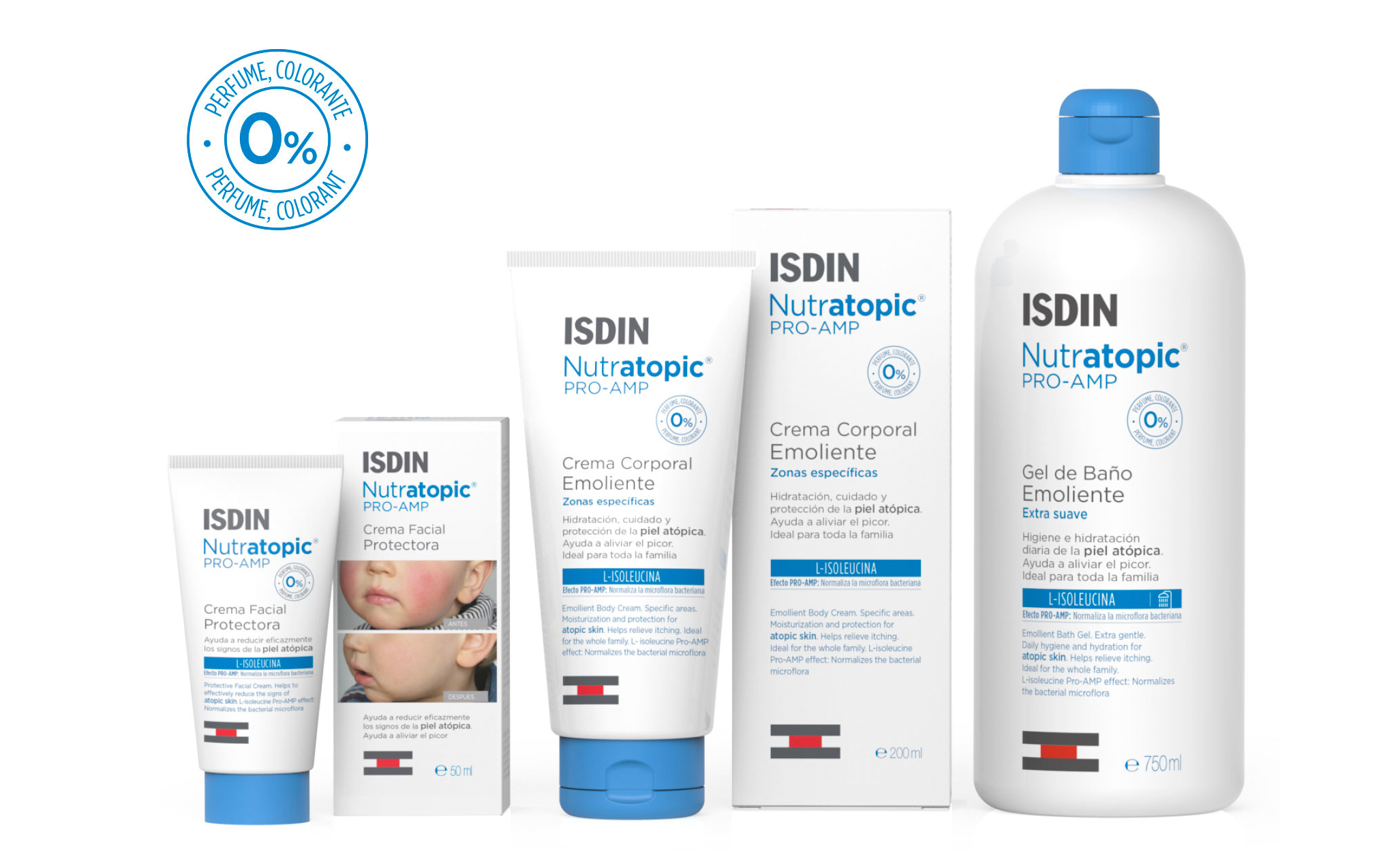Nutratopic Pro-AMP Pro-AMP Action
Nutratopic Pro-AMP fights all signs, efficiently breaking the atopic dermatitis vicious cycle
Atopic dermatitis (AD), a problem with disruptive symptoms involving a vicious circle.
AD comes from a disorder in the skin’s barrier function, with a destructured or altered barrier and an immune deficiency that makes it more vulnerable to possible allergens or pathogens.
Atopic skin is dry skin, as its deficient structure makes it easier for it to lose moisture. Dryness means itching, and itching means scratching. Areas of inflamed or injured skin with atopic eczema can lead to an increase in the adhesion and proliferation of bacteria (Staphylococcus aereus) that can occasionally result in complications, such as the risk of microbial superinfection.
Nutratopic Pro-AMP combats all the symptoms, breaking the circle
Thanks to its formula with specific active substances, Nutratopic Pro-AMP is a comprehensive solution to Atopic Dermatitis, effectively combating all the symptoms and breaking the circle.
With double active protection, it restores the skin barrier by reinforcing its lipid mantle and the skin’s immune system, thanks to its formula with L-isoleucine (Pro-AMP).
It provides deep moisturisation, relieves itching and thus reduces scratching, helps to reduce inflammation and inhibits the risk of bacterial adhesion thanks to its formula with Niacinamide and Rhamnosoft.
Every product in the Nutratopic range has been formulated with a combination of active ingredients that improves symptoms associated with the outbreak of atopic dermatitis, itchiness, redness, flaking, reactivity and dryness. Paediatrically and dermatologically tested for proven efficacy and tolerance. Does not contain preservatives, perfumes or colorants.
In atopic dermatitis, the pruritus and damage caused by scratching increase the inflammation, thus suppressing antimicrobial peptide (AMP) production. L-isoleucine stimulates the production of these peptides, which represent the skin’s first line of defence.
Atopic dermatitis acts like a vicious circle that can be aggravated by scratching. It is therefore very important to take steps to stop the itching and prevent scratching. It is also important to reinforce anti-inflammatory activity.
They provide the emollience required, a combination of moisturisation and protection, strengthening the lipid mantle.
It inhibits the risk of superinfection and bacterial adhesion. 80%-90% of patients with AD present colonisation of the skin by Staphyloccous aureus. The severity of atopic eczema is correlated to bacterial colonisation. The effect of Rhamnosofot strengthens anti-inflammatory activity and bacterial adhesion inhibition.
1-It reinforces the skin’s immune system thanks to L-isoleucine, increasing antimicrobial peptide (AMP) production
2-It inhibits the risk of bacterial adhesion thanks to its Rhamnosoft content.
Antimicrobial peptides (AMPs) are an essential component of the skin’s innate immune system. They have powerful antimicrobial and antiviral activity. In atopic dermatitis, AMPs are reduced, leaving the skin more vulnerable to infection.
L-isoleucine is an essential amino acid that stimulates AMP synthesis and production, strengthening the skin’s innate immune system.
“Atopic skin can be understood as a faulty wall, which you have to supplement with all the missing or deficient parts: antimicrobial peptides (…)” Eulalia Baselga, MD - Dermatologist. Head of Dermatology Hospital de la Santa Creu i Sant Pau.
“The expression or activation of antimicrobial peptides is essential in the skin’s ability to resist bacterial infection in patients with atopic dermatitis who have a defective antimicrobial barrier”. Peter Elias, MD - Dermatologist. University of California, San Francisco. Doctor and expert in the barrier function. Creator of the “brick & mortar” concept of the corneal stratum, an example of the structure of the epidermis as a protective layer of the skin.
References: 1. Licari A, Marseglia A, Agostinis F, et al. Barrier Repair Therapy in Atopic Eczema: E_ects of Isoleucine, Rhamnosoft, Ceramides and Niacinamide Facial and Body Creams on Clinical, Itch and Staphylococcus aureus Skin Colonization: A Prospective Assessor-Blinded Study. Clin Pediatr Dermatol. 2016, 2:1. 2. Fabio Agostinis MD and Massimo Milano MD. Barrier Repair Therapy in Atopic Eczema: e_cay of an isoleucine, rhamnosoft and niacinamide body cream. A pilor, prosppective study. Poster 24th EADV Copenhagen 2015. 3. Marseglia A, Licari A, Agostinis F, Barcella A, Bonamonte D, Puviani M, Milani M, Marseglia G. Local rhamnosoft, ceramides and L-isoleucine in atopic eczema: a randomized, placebo controlled trial. Pediatr Allergy Immunol. 2014 May;25(3):271-5.





